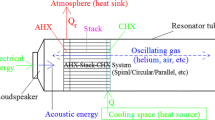Abstract
Investigations on the relations between the phase angle of the acoustic impedance at the driver piston and the system performance of a standing wave thermoacoustic cooler were performed. The system performance measured at a fixed acoustic power showed that the coefficient of performance of the standing wave thermoacoustic cooler increases as the phase angle increases when the stack temperature span is relatively low. The results were consistent with the simulation results obtained from DELTAE, a computer code based on linear thermoacoustic theory. Analysis on the temperature profiles along the stack showed that the cooling efficiency (COP) of the system could be decreased or increased as the phase angle of the acoustic impedance at the driver piston changes depending on the stack temperature spans.
Similar content being viewed by others
References
G. W. Swift, Thermoacoustics: A unifying perspective for some engines and refrigerators, Acoustical Society of America, New York, USA, (2002).
F. V. Hunt, Electroacoustics: The Analysis of Transduction, and its Historical Background, Acoustical Society of America, New York, USA, (1982). (Original work published by Wiley, New York, 1954).
R. W. Wakeland, Use of electrodynamic drivers in thermoacoustic refrigerators, J. Acoust. Soc. Am. 107 (2000) 827–832.
L. L. Beranek, Acoustics, Acoustical Society of America, New York, (1982). (Original work published by McGraw-Hill, New York, 1954).
I. Paek, L. Mongeau, and J.E. Braun, A method for estimating the parameters of electrodynamic drivers in thermoacoustic coolers, J. Acoust. Soc. Am. 117 (2005) 185–193.
I. Paek, J. E. Braun and L. Mongeau, Characterizing heat transfer coefficients for heat exchangers in standing wave thermoacoustic coolers, J. Acoust. Soc. Am. 118 (2005) 2271–2280.
M. J. Moran and H. N. Shapiro, Fundamentals of engineering thermodynamics, Wiley, New York, USA, (2000).
F. Incropera and D. Dewitt, Fundamentals of heat and mass transfer, Wiley, New York, USA, (1996).
J. R. Taylor, An introduction to error analysis, University Science Books, California, USA, (1997), Eq. (3.47).
W. C. Ward and G. W. Swift, Design environment for low amplitude thermoacoustic engines (DeltaE), J. Acoust. Soc. Am. 95 (1994) 3671–3672. Software and user’s guide available either from the US Los Alamos national laboratory thermoacoustics website at www.lanl.gov/thermoacoustics/ or from the Energy Science and Technology Software Center, US Department of Energy, Oak Ridge, Tennessee.
W. C. Ward and G. W. Swift, DELTAE Tutorial and User’s Guide Version 5.1, Los Alamos National Laboratory, New Mexico, USA, (2001).
I. Paek, L. Mongeau and J.E. Braun, Performance Characterization of a Small-Capacity Thermoacoustic Cooler for Air-conditioning Applications, submitted in J. Acoust. Soc. Am.
T. J. Hofler, Thermoacoustic refrigerator design and performance, Ph.D. dissertation, Physics department, University of California San Diego, California, USA, (1986).
Author information
Authors and Affiliations
Corresponding author
Additional information
This paper was recommended for publication in revised form by Associate Editor Yeon June Kang
Insu Paek received the B.S. degree in Mechatronics Engineering from Kangwon National University, Chuncheon, Korea, in 1997, the M.S. degree in Mechanical Engineering from the University of Texas at Austin, USA, in 2000, and the Ph. D. degree in Mechanical Engineering from Purdue University, West Lafayette, USA, in 2005. He worked as a postdoctoral researcher in Purdue University and McGill University in 2006 and 2007. He is currently a faculty member in the Department of Mechatronics Engineering, Kangwon National University, Chuncheon, Korea. His research interests include thermoacoustic cooling and power generation, solar heat driven absorption cooling., and wind power.
Luc Mongeau received the B.S. and M.S. degrees in mechanical engineering from the University of Montreal, QC, Canada, in 1984 and 1986, respectively, and the Ph. D. degree in Acoustics from Pennsylvania State University, University Park, USA, in 1990. He is currently a professor in the Department of Mechanical Engineering at McGill University, Montreal, QC, Canada. He has published over 50 archival journal publications on various topics related to acoustics and noise control. His research activities are in the flow and turbomachinery noise areas, as well as in the areas of voice production, and thermoacoustic refrigeration.
James E. Braun received the B.S. degree in Mechanical Engineering from the University of Massachusetts, USA, in 1976, and the M.S. and Ph. D. degrees in Mechanical Engineering from the University of Wisconsin, Madison, USA, in 1980 and 1988, respectively. He is currently a professor in the Department of Mechanical Engineering, Purdue University, West Lafayette, USA. Professor Braun’s research combines the use of computer modeling, optimization, and experiments to study and improve the performance of thermal systems. He has published over 140 papers. Professor Braun is currently an associate editor for the international journal of HVAC&R Research.
Shin You Kang received the B.S. and M.S. degrees in the Department of Mechanical Design from Seoul National University, Seoul, Korea, in 1982, and 1986, respectively. He then received the Ph.D. in Mechanical Engineering at the same university in 1992. Professor Kang is currently a professor in the Department of Mechatronics Engineering, Kangwon National University, Chuncheon, Korea. His research interests include mechanical structure design, crash analysis, optimal design, computational structure analysis and evaluation.
Rights and permissions
About this article
Cite this article
Paek, I., Mongeau, L., Braun, J.E. et al. Phase of acoustic impedance and performance of standing wave thermoacoustic coolers. J Mech Sci Technol 23, 1476–1484 (2009). https://doi.org/10.1007/s12206-009-0351-2
Received:
Revised:
Accepted:
Published:
Issue Date:
DOI: https://doi.org/10.1007/s12206-009-0351-2




